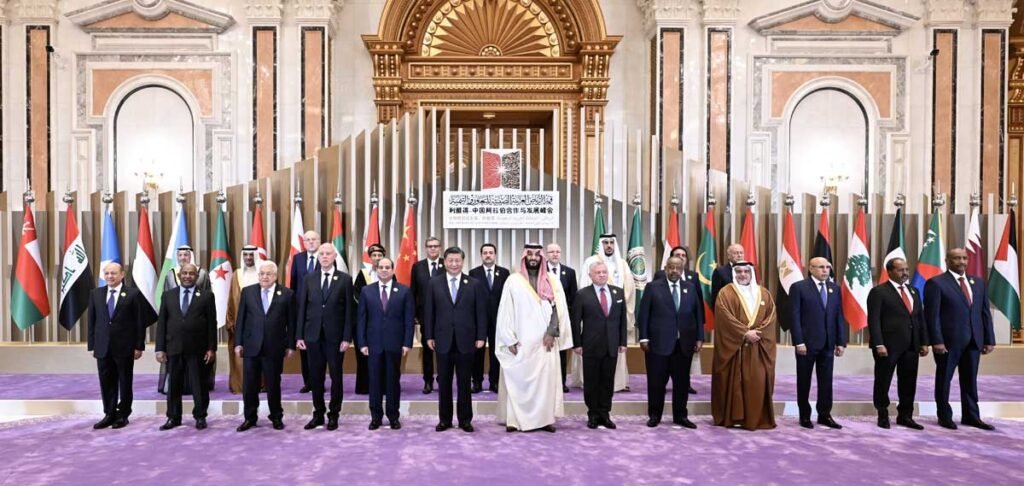
China’s interaction with the Arab nations dates back to the age of the ancient Silk Road trade routes, which facilitated extensive economic and cultural exchanges between China and West Asia. The backdrop of the 10th Ministerial Conference of CASCF held in 2024 in Beijing emphasised the significance of this strategic alignment amidst the shifting geopolitical dynamics.
In modern times, Arab nations have maintained their strategic relationship with China through economic cooperation and technological and infrastructural investment. The China-Arab States Cooperation Forum (CASCF) has played an essential role in transforming the relationship. Since the establishment of CASCT, both sides have experienced increased economic growth, generating $431.4 billion in trade as of 2022. Undoubtedly, mutual investments have accelerated economic growth and progress, but they have also brought about a dependency that may jeopardise the ability of several Arab States to maintain their monetary sovereignty as they may become excessively reliant on Chinese technology and finance, which could stifle domestic innovation and industry.
China views its Belt and Road project as a strategic development that will make Arab and other states economically dependent on China and increasingly influenced by Chinese diplomacy, in keeping with its global ambitions. Cultural ties enhance Beijing’s soft power in the Arab states.
Algeria for one has vast natural resources and Sino-Algerian annual trade hit $9.466 billion in 2023. However, increasing dependency on China limits Algeria’s ability to develop its industrial base. Egypt’s large-scale industrial projects create economic growth but lead to ecological concerns, as the partnership can strain scarce water resources and degrade agricultural land. As part of its Vision 2030, Saudi Arabia has allowed Chinese investment in its infrastructural and industrial development, and this reliance on China in fields like AI and telecommunications poses data security risks for the Kingdom.
China’s influence on politics and diplomacy in the UAE for instance limits its ability of that country to pursue an independent foreign policy on issues sensitive to China, like the treatment of Uyghur Muslims. The BRI initiative is part of a greater strategic plan for the PRC’s global economic expansion, neglecting environmental concerns in the long run by exploiting Arab resources such as energy and oil. China’s debt trap is a very real threat to Arab nations. According to the IMF, Djibouti, located at the entrance of the Red Sea, is heavily indebted to China, with $1.4 billion in debt, equal to 45% of the country’s GDP. This eventually can compel that state to give control over strategic assets to the creditor, as it happened in Sri Lanka.
As China continues to increase its influence in Arab nations, the implications for India are becoming significant. The deepening ties between China and the Arab world, mainly through initiatives like the Belt and Road Initiative (BRI), raise challenges on multiple fronts. India’s economy heavily depends on oil and gas imports from the Middle East China’s leverage on these nations makes India more vulnerable, posing a risk of supply disruption and adverse effects on Indo-Arabian relations. China’s interventionism and its rising dominance over sea and land routes reduce New Delhi’s influence in the region. Beijing’s investments in infrastructure, technology, and business shrink India’s market share in crucial Gulf states like Saudi Arabia and the UAE. The establishment of military and naval bases by the PRC in the Red Sea, the Arabian Peninsula, and the Indian Ocean region poses a security threat to India’s own civilian and military facilities in the area. In addition, Chinese cooperation with Arab nations weakens India’s diplomatic relations in global forums, especially concerning the unresolved border dispute between Beijing and New Delhi and the latter’s goal to become a permanent member of the UN Security Council. Chinese influence may also eventually affect the Indian diaspora in the Middle East as it can reduce employment opportunities for Indians in the sectors of construction, oil, gas, and other services. Chinese soft power influence is underestimated and its endeavour to increase collaboration in the realm of professional and scientific education may weaken the region’s traditional cultural and technological ties with India.
China’s increasing presence in many Arab states has transformed the business, economic, and cultural environment there, making it more competitive. Therefore, India must deepen and widen its strategic engagement with those nations.






Add comment